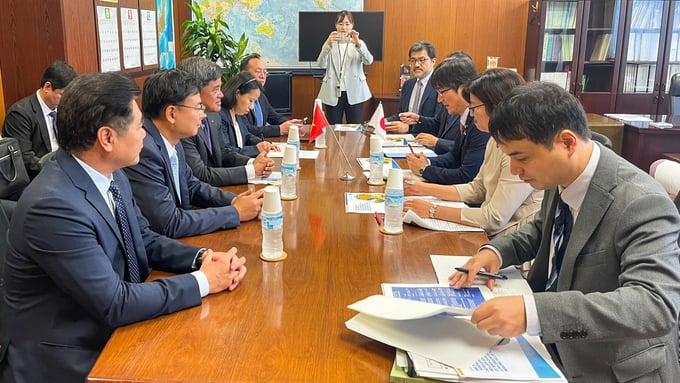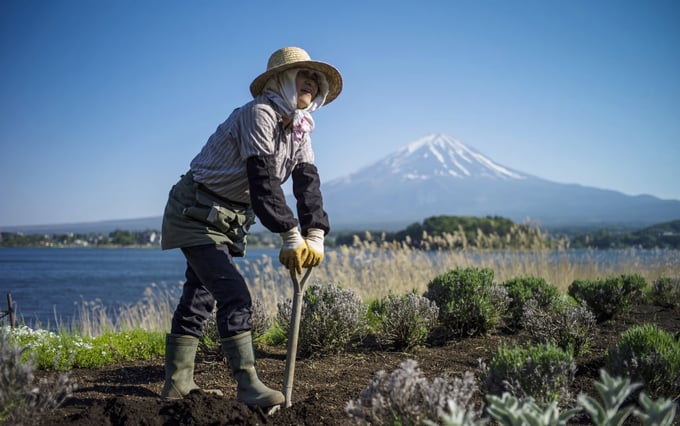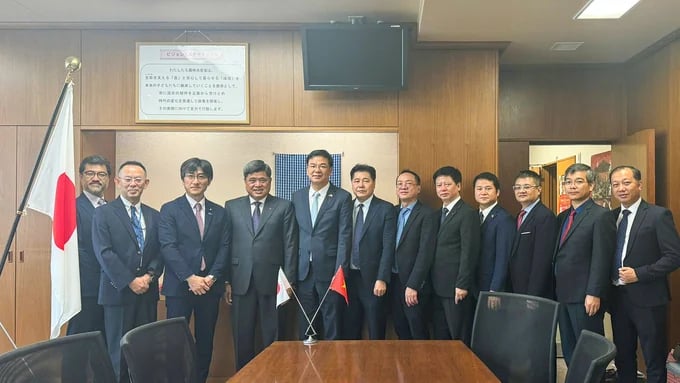May 29, 2025 | 20:56 GMT +7
May 29, 2025 | 20:56 GMT +7
Hotline: 0913.378.918
May 29, 2025 | 20:56 GMT +7
Hotline: 0913.378.918

A meeting between Deputy Minister of Agriculture and Rural Development Tran Thanh Nam and Deputy Minister of Agriculture, Forestry, and Fisheries of Japan Maitachi Shouji took place on August 20. Photo: ICD.
On the morning of August 20 in Tokyo, Japan, Deputy Minister of Agriculture and Rural Development Tran Thanh Nam met and worked with Mr. Maitachi Shouji, Deputy Minister of Agriculture, Forestry, and Fisheries of Japan.
In recent years, alongside the global transition to green agricultural production, the governments of Vietnam and Japan have made strong commitments towards the goal of carbon neutrality by 2050.
During the meeting, Deputy Minister Tran Thanh Nam shared the objectives of the "1 Million Hectares of High Quality, Low Emission Rice Project" linked to green growth in the Mekong Delta (the project).
According to the Deputy Minister, to effectively implement the project, it is essential to mobilize resources to support the enhancement of capacities for cooperatives and farmers. Therefore, Deputy Minister Tran Thanh Nam proposed that Japan collaborate in implementing programs to improve the capacity of cooperatives involved in the project. Specifically, this includes developing a digital management system for the supply chain and establishing a monitoring and evaluation system for emission reductions.
Deputy Minister Maitachi Shouji welcomed Vietnam's initiative for the sustainable transformation of the rice sector and added that Japan's agricultural extension system is organized from the central to the local level. Currently, the system has a team of 10,000 people, and each province has a center for farmer training.
In addition, Japan's electronic agricultural extension system is considered a network that supports quick and effective information exchange between agricultural extension agencies, agricultural extension officers and farmers.
Mr. Maitachi Shouji understands that, for Vietnam as well as Japan, the extension system is a basic foundation for transferring scientific and technological knowledge, training, equipping farmers and cooperatives with the tools to transition production models, access science and technology, and market opportunities.
The Japanese Deputy Minister expressed interest in supporting Vietnam to improve and upgrade its practical agricultural training program in a multifunctional direction. He also acknowledged the proposal to enhance the capacity for agricultural extension work, initially to implement the project and subsequently in regions producing standardized raw materials as directed by the Ministry of Agriculture and Rural Development.

Japan is a country with strengths in training and educating agricultural extension staff. Illustration photo.
The Japanese side expressed confidence that the dialogue partnership between ASEAN and Japan over the past 50 years has helped Japan become a trusted partner for Vietnam.
Accordingly, Deputy Minister Trần Thanh Nam hopes that the Ministry of Agriculture, Forestry and Fisheries of Japan will support and create conditions for competent agencies such as the Japanese Embassy in Vietnam, the Japan International Cooperation Agency (JICA), and Japanese non-governmental organizations to assist the training institutions of the Ministry of Agriculture and Rural Development.
The two leaders also discussed promoting and facilitating cooperation between Japanese and Vietnamese businesses, including joint ventures and investment in areas such as organic agricultural production, digital technology in agriculture, logistics, and agroforestry - fisheries trade.
With the potential for cooperation in organic agriculture, the Ministry of Agriculture and Rural Development leaders suggested that Japan consider developing a program to encourage Japanese businesses to collaborate with Vietnamese businesses in investing in organic agriculture and applying digital technology in agriculture.
The medium- and long-term vision for Vietnam - Japan agricultural cooperation has undergone two phases: 2015-2019 and 2020-2024. Based on this, strategic cooperation in agriculture between the two countries has increasingly developed and achieved significant accomplishments.
Specifically, in terms of trade, the two countries actively open their markets to each other's agricultural products, leveraging the advantages of the free trade agreements both sides are involved in. Bilateral trade in agricultural, forestry, and fishery products has consistently grown at a stable and balanced rate.
Japan is currently one of the major export markets for Vietnam's agricultural, forestry, and fishery products, accounting for about 7.5% of the total annual export value of these products. The average export growth rate over the past 10 years has been 6.35% per year.
To boost agricultural trade, Japan has proposed that the two countries enhance cooperation in high - quality agriculture by attracting investment, technology, and knowledge transfer based on agreements between them.

In order to promote agricultural trade, Japan proposed that the two countries strengthen high-quality agricultural cooperation. Photo: ICD.
Deputy Minister Trần Thanh Nam has requested the Japanese side to expedite the completion of procedures for Vietnamese grapefruit to be approved for import into the Japanese market and to continue assessing the risk and pest evaluation for Vietnamese passion fruit and butter from Vietnamese cow's milk.
The Ministry of Agriculture and Rural Development has also instructed its relevant departments to promptly finalize the procedures for Japanese grapes to be approved for import into Vietnam and to continue reviewing the import requests for Japanese peaches and pufferfish.
The specialized agencies of both Ministries of Agriculture are currently reviewing the related documents and anticipate that in the first quarter of 2025, the two Ministers will sign the "The Medium and Long term Vision for Vietnam - Japan Agricultural Cooperation" for the period 2025-2029.
Translated by Phuong Linh

(VAN) Ms. Nguyen Thi Dung, Deputy Director of Ngoc Hoang Cooperative, shared about the journey of bringing dragon fruit to Europe, achieving annual revenues in the billions of VND.

(VAN) Bamboo products from Thang Tho Bamboo Cooperative have reached many countries around the world, while also creating jobs for local workers.

(VAN) The Management Board of Con Dao National Park reported that a green sea turtle, tagged in the Philippines, has traveled thousands of kilometers to lay 84 eggs on Bay Canh Islet.

(VAN) Green technology is paving a new path for sustainable aquaculture in the Mekong Delta in particular and across the country in general, helping reduce emissions and adapt to climate change.

(VAN) On May 27, La French Tech Vietnam (the French startup and innovation community in Vietnam) held the French Tech Summit Vietnam 2025.
/2025/05/27/4731-2-223159_980.jpg)
(VAN) No votive paper, no styrofoam, no plastic bags, no plastic bottles, and no single-use plastic trays are the key rules tourists should keep in mind when visiting Con Dao.

(VAN) In the fight against plastic pollution, Vietnam has been demonstrating a proactive, pioneering, and active role in addressing the greatest environmental challenge today.